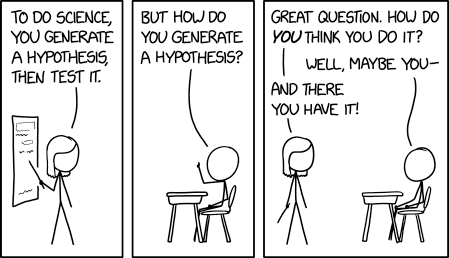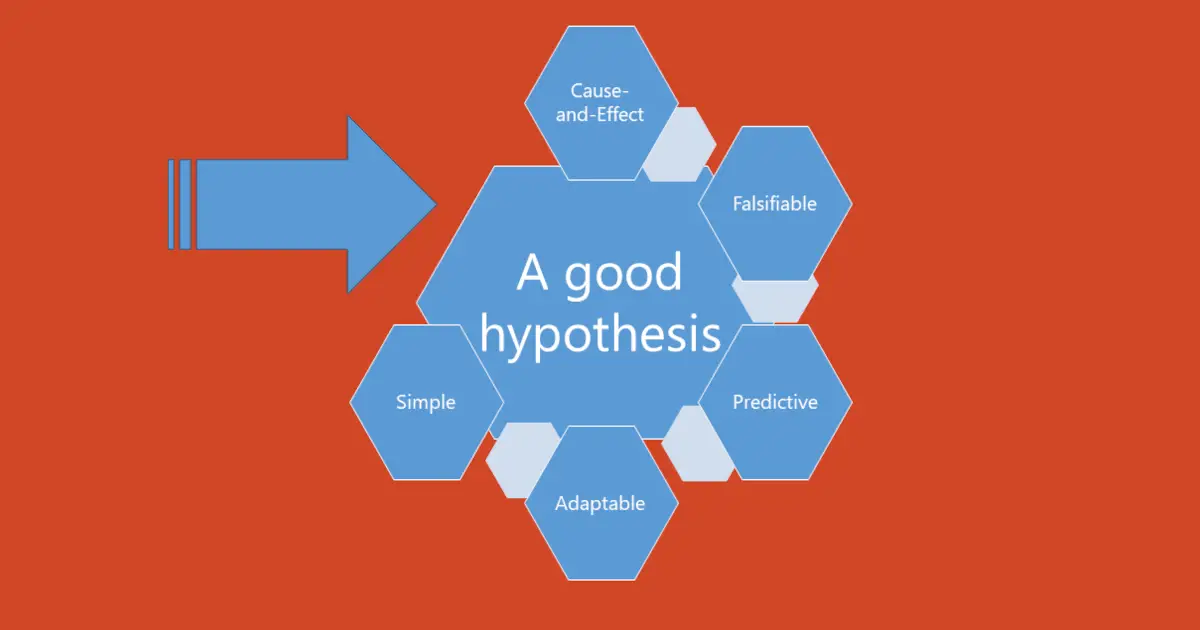I have wrongly assumed that my advanced education students already know how to write a hypothesis as I expected them to do so during my statistics class. In fact, I recalled that I asked them to formulate the hypothesis in fictitious situations during one of the major exams. I was wrong to assume that they already know how. Many of them do not know how to write a hypothesis even after giving them written examples in one of the course modules.
For those who pretend that they already know but not in reality, here is a refresher on how to write the hypothesis. Read on and be confident in writing the hypotheses anticipating the preparation of your research proposal.
A hypothesis is a pivotal cornerstone in the arena of scientific research. It’s a tentative explanation or prediction about a particular phenomenon that is yet to be tested. It is what sparks a research endeavour, setting the course towards discovering the unknown or further reshaping our understanding of what we already know.
Understanding what a hypothesis is and how to formulate one sufficiently equips individuals to delve into research processes skillfully with a clear direction in mind. More so, learning how to structure a hypothesis ensures that this inquiry framework is done satisfactorily and accurately.
Our discourse will center around understanding the concept of hypotheses, structuring a hypothesis, and providing concrete examples to enhance comprehension.
Table of Contents
The Unifying Concept of Hypotheses
The Indispensable Role of a Hypothesis in Scholarly Research
An integral component that shapes the course of systematic research is the hypothesis. This initial posited explanation of a phenomenon, guided by preliminary observations, plays a pivotal role in conducting experiments, observations, and further inquiries. Solving a research puzzle without a hypothesis might compare to navigating an ocean without a compass; it provides direction and purpose to the exploratory journey.
The hypothesis is the initial posited explanation of a phenomenon, guided by preliminary observations.
A hypothesis emanates from the core of observation and deductive reasoning, supported by existing theories and insights. Its primary role is to establish a connection between two or more variables, stringing them together into an initial explanation to the problem at hand.
A Simple Example: Wilting Plants
To provide some context, let’s take an elementary level example: If a third-grade student aims to understand why the plants in his classroom are wilting, he could formulate a hypothesis, such as, “The classroom plants are wilting because they are overwatered.”
This hypothesis holds three principal constituents: the dependent variable (the wilting plants), independent variable (the amount of water), and the relationship between them. In this example, the student predicts that overwatering triggers the wilting response in the plants.
Characteristics of a Hypothesis
The art of crafting a hypothesis mandates precision and clarity. An obscure hypothesis holds the potential to steer the investigation into a fog of confusion; hence, specificity is the researcher’s best friend.
Pertinently, the hallmark of the hypothesis resides in its testability. A hypothesis must be designed such that it yields predictions which can be tested, thereby substantiating or refuting the initial assumption, taking the researcher closer to the truth.
The importance of a hypothesis in research extends beyond its role as an explanatory framework. It also serves as a checkpoint for relevance and scope, ensuring that researchers remain focused on addressing the initial query and do not saunter into irrelevant territories.
Moreover, the hypothesis also facilitates deductive reasoning by highlighting the expected outcomes, thus defining what must be measured and observed. Consequently, it assists in designing the structure of the research, deciding what data must be collected, and how it should be analyzed.
Fundamentally, one might label a hypothesis as the scientific method’s firstborn, providing direction, structure, and a basis for analysis. It strengthens the link between theory and observation, bringing coherence to the realm of research.
Despite its preliminary role, the hypothesis can make or break the research journey, attesting to its paramount significance in the pursuit of knowledge. Thus, understanding and valuing the role of a hypothesis is not just a scientific duty, but a dedication to the quest for wisdom.

5 Important Points on How to Write a Hypothesis
Beyond these fundamental components, the structuring of a good hypothesis carries immense weight towards achieving a valid and impactful research outcome. Therefore, careful attention to the building blocks of a successful hypothesis is essential. Here are five pointers on how to write one.
1. Must be simple
First and foremost, a robust hypothesis must be incisively simple. It should be aimed at addressing one query at a time; attempting to encapsulate multiple queries in a singular hypothesis can lead to ambiguity, confounding results, and thereby compromise the clarity of the findings. Thus, excising any superfluity or removing the unnecessary statements or phrases allows for precise implementation and interpretation of research results.
2. Incorporates a cause-and-effect relationship
A sophisticated hypothesis should intuitively incorporate a ‘cause and effect’ relationship. It should not only identify the variables involved but also elucidate how these variables interact. This required interplay lends the hypothesis strength, providing researchers with a clear path to follow while studying phenomena.
When decoded, these relationships shed light on alterations in dependent variables as a direct result of fluctuations in independent variables. The causal relationship might hold the key in advancing some of the most profound understanding of natural and social phenomena. It provides the necessary scaffolding for making inferences about realities.
3. Falsifiable
Perhaps the most critical component of a good hypothesis, is its falsifiability. Even the most artfully constructed and compelling hypothesis falls short if it cannot be tested empirically.
A good hypothesis sets the stage for creating situations wherein the relationship between variables can be tested, measurements can be taken, and observations can be recorded. The very essence of scientific research revolves around the ability to refute or confirm hypotheses, pivoting on the axis of falsifiability.
Falsifiability spurs researchers to think critically about what kind of evidence could potentially contradict their hypothesis. This willingness to accept that a hypothesis could be disproved characterizes the humble pursuit of truth in scientific research, constantly reminding scientists that all knowledge is provisional, and subject to revision in the face of compelling contrary evidence.
4. Predictive in nature
The hypothesis should be predictive in nature, suggesting a probable, logical consequence that can be empirically observed under specific conditions. This predictive quality illuminates the path of research, guiding the search for unknowns. It determines the methodological decisions in the study and plays a crucial role in facilitating the scientific method, serving as a bridge between theory and reality.
Predictive capacity invites researchers to look forward, as they can make informed anticipations about the probable outcomes and results of their studies. By being able to predict, researchers can be better prepared to understand, interpret, and make use of their findings. It further strengthens the hypothesis-testing approach, acting as the engine that drives the evolution of knowledge.
5. Organic and adaptable
Finally, a hypothesis should be organic and adaptable. As research progresses, new data or insights may necessitate revisiting of the hypothesis. Good research is flexible and permits adjustment of the hypothesis to better align with emerging data.
An adaptable hypothesis pays tribute to the spirit of perseverance and curiosity that fuels the scientific endeavor. The process should be iterative; as the findings continue to unfold, the hypothesis should be capable of rerouting itself in light of emerging understanding. Adaptability embosses responsiveness in the methodology, which, in turn, keeps the hypothesis alive and significant in the constantly metamorphosing landscape of scientific research.
In summary, an optimal hypothesis engages simplicity, defines cause and effect relationships, guarantees falsifiability, offers predictive value, and remains malleable to new insights. Bearing these tenets in mind while formulating a hypothesis can exponentially enhance the quality and outcome of scientific research, revealing a more profound understanding of the world around us.

Key Takeaways
Indeed, formulating a solid hypothesis is vital in the cycle of scientific inquiry. It does not simply signify an assumption or a wild guess but is an educated and well-informed conjecture that sets the trajectory of an investigation.
Gaining proficiency in constructing a hypothesis not only imparts clarity to the research process but also augments the ability to decode scientific studies. By recognizing how hypotheses are structured and understanding their function in research, one can engage more profoundly in scientific learning and possibly contribute to the expansive universe of knowledge.
Emulating the provided pointers on how to write a hypothesis can sharpen this mastery and serve as the launching pad towards scientific exploration and discovery.

